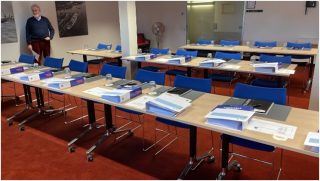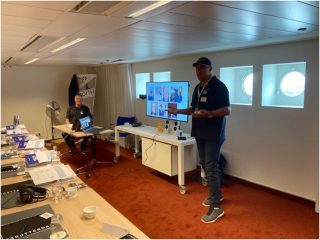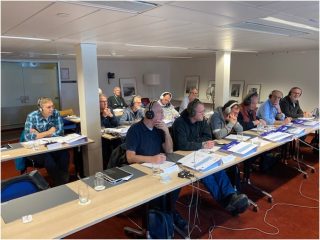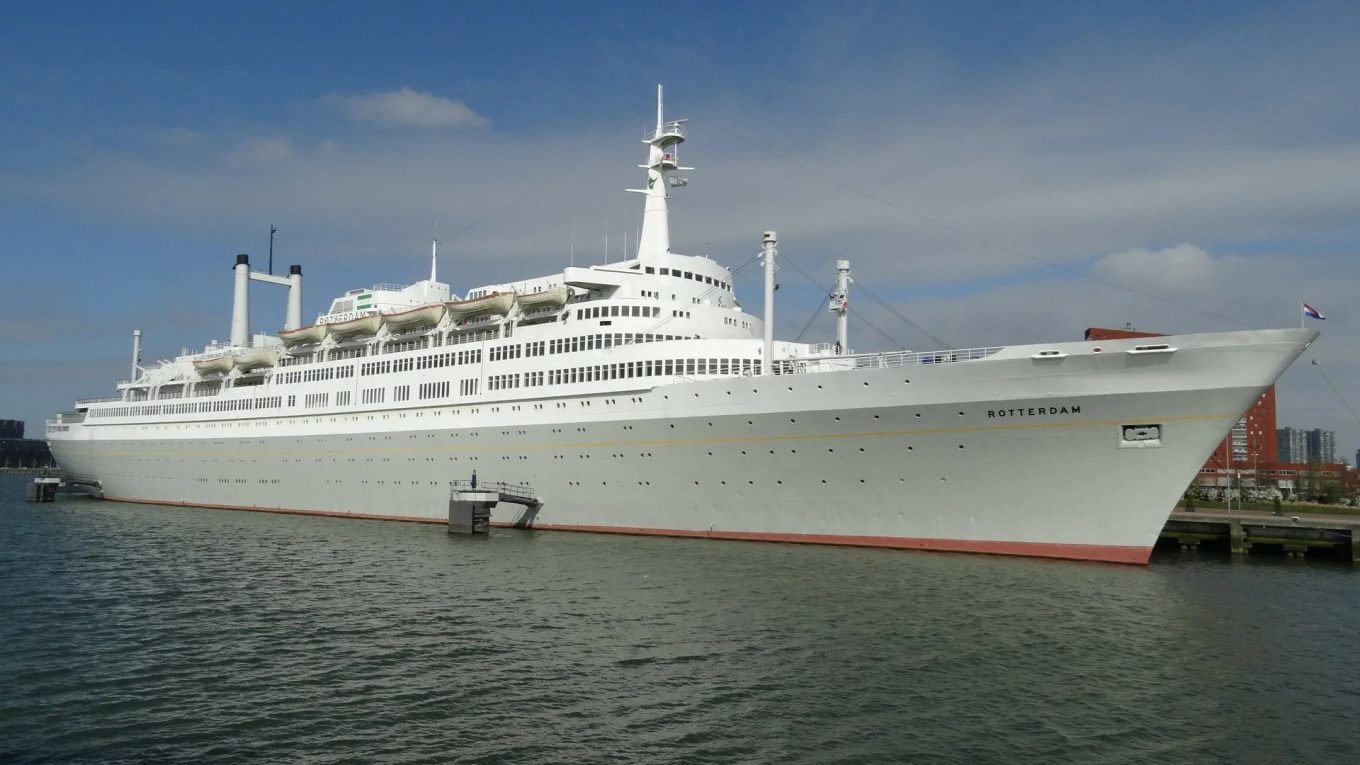The Morse Academy on board of the S/S Rotterdam has started
On Saturday November 5, 2022 the MA started the long awaited Morse Code courses that will train a large number of mostly radio amateurs ‘The true art of beating brass’, within a year. For this, 6 ex Radio Officers were asked to share their Morse Code experiences with the students,augmented by a number of additional modules such as Morse History, Straight Keys, Operating Practice, Technique and Morse as well as CW Contesting. Truly a wonderful/unique program, within the framework of our Historical Cultural Heritage. The Morse Academy has obtained full cooperation from Westcord (Owners of the ‘ss Rotterdam) tohold these courses on board this historical passenger ship, which is permanently moored in one of the ports near the centre of Rotterdam, and presently used as a hotel ship; with beautiful rooms, theatres, bars, conference rooms, restaurants etc.
The start took place in the ‘Trinidad’ room, which is equipped with all the necessities to give the students the best chance to master this difficult matter thoroughly. The MA uses the so-called Koch system, in combination with the Farnsworth method, which is quite tough in the beginning because the Morse characters are presented with a speedy tempo, but with large intervals.
The students have been provided with a beautiful and generously compiled syllabus. Furthermore, the timetable for the coming months was handed over, as well as the lesson program of the ‘immortal alphabet’.

The classroom
After an excellent introduction by teacher Fred, a nice round of student introductions followed, during which everyone could briefly tell their own story and the teachers could also present themselves. This was followed by an introduction to the first six Morse characters, which were initially presented individually 10 x. This was followed by the same six characters ‘at random’ with a speed of 18 wpm and a spacing of 5. The teachers got the impression that in the beginning most students had a lot of trouble with this, with the exception of a few, who already had some experience with Morse Code. After practising the characters in sets of 2 at the same speed, things soon got better, and the students gained more confidence. Everything was entrusted to paper so that people could later check where mistakes had been made.
Evidently this course requires the utmost commitment from the students, which also means that they will have to practise at home every day for about 20 minutes to be able to recognize and distinguish the characters (combinations of dots and dashes) as audio sounds.
Frits (our oldest, but proud teacher; see photo above) explained during the short break not to start with keying until all characters (41 in total) have been mastered. The chance that one learns a wrong keying method is not imaginary. This will be discussed further on in the course.
Frits will also continue the ‘History of Morse’ in a separate module.
Teachers Fred and Dick taught in understandable language; put everyone at ease and gave a very experienced impression.The room made available was well equipped and a plentiful supply of coffee and thirst quenchers was broughtin by a charming lady. The technology did not fail and every student could connect a pair of headphones to the PI4HAL boxes, e.g. enabling good concentration. With the Westcord equipment such as a TV and HDMI cable, the laptop screen could be presented prominently aided by a set of loudspeakers. In short, a very memorable and professional first lesson in an informal atmosphere.
 The teachers
The teachers
Apart from familiarisation of the Morse Code characters and experiencing material that is interesting for most radio amateurs, the Morse Academy hopes to eventually train the students to participate in an exam approved by the AT (Telecom Agency) in order to obtain the addition ‘CW included’ on their registration card.
The MA has started with 2 beginner classes of 10-12 people each and 1 advanced class of 6 participants. Classes are taught alternately every 14 days in the weekends, which means that a Morse class is practised virtually every week on board the ‘ss Rotterdam’, either on a Saturday or Sunday. The MA makes grateful use of the benevolent cooperation of Westcord and their staff who make it possible for the MA to benefit from the wonderful and unique entourage.
Incidentally, the MA was set up not from any profit motive but purely out of enthusiasm and a wish to continue the great Historical Cultural Heritage. The Morse alphabet is and will remain immortal.

The CW students of the Morse Academy
Kind regards,
Harm de Haan/PG2GF
The Netherlands
